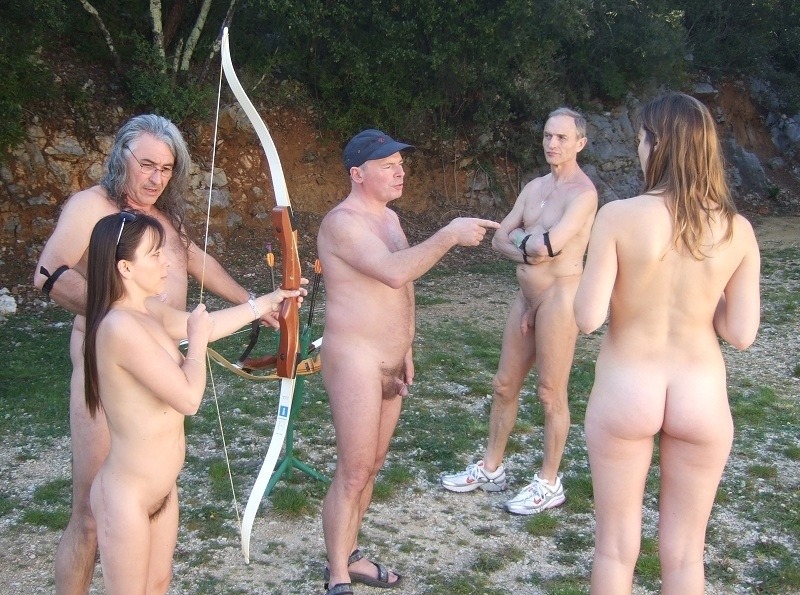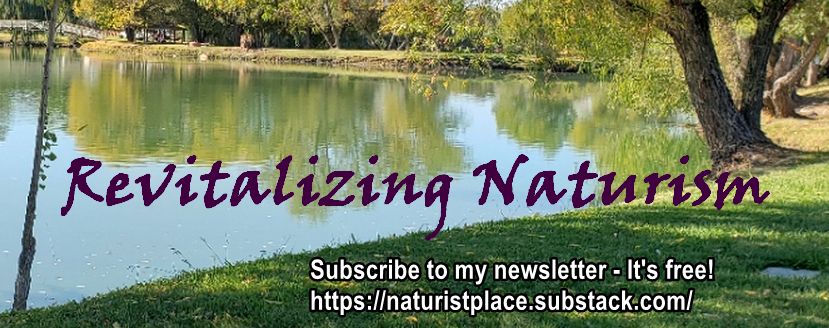
If you enjoy social nudity and consider yourself a naturist you understand why nudity is a very good thing – a great thing in fact. You can quickly think of a number of points supporting a positive opinion of nudity and naturism.
Once you’ve realized you find being naked quite enjoyable, there’s the issue of whether to tell others about it. Of course, this step is often difficult to take. Hopefully, however, you can convince yourself to do it. And once you have, a good next step is persuading others to try social nudity themselves. You would like others you know to try naturism too, right? This article will present a strong reason for taking both steps – and then using that reason to persuade others as well.
If you’ve already begun discussing naturism with others, you’ve probably found that it’s difficult to convince them sufficiently of the positives that they’ll try it too. If you truly enjoy nudity, then you almost certainly want others close to you also to enjoy it. So let’s look at another good reason for social nudity – besides how good it feels – that might be persuasive – a reason in which nudity itself isn’t the main factor.
Naturists often wonder what are the best arguments for promoting social nudity to others. There are a variety of ideas. Tell how good it feels to be naked. List various (possible) health benefits of nudity. Explain how body acceptance is greatly improved by often going without clothes. And so on. I’ve suggested 11 arguments for nudity. If you don’t see one or more of your favorites there, I’ll mention other lists below.
But there’s one argument that’s hardly ever mentioned, and perhaps little recognized. People who have significant interests- especially some (like naturism) that are rather uncommon – often have difficulty finding friends who share that interest. The argument is that participating in social nudity can be a significant help with that – for interests that are unrelated to naturism.
In my arguments for nudity, was a hint in item 9 that participation in naturism helps making new friends who also have other significant interests in common with you besides nudity. Here’s a more detailed explanation: That new friend you’ve been looking for might be a naturist. If this realization increases your own desire to become more involved in naturism, you can see how it may be persuasive when promoting naturism and social nudity to others.
When naturists are asked why they enjoy being naked occasionally – or even whenever possible – most will probably offer reasons like those already suggested. Those reasons are quite valid and widely recognized by naturists. But someone who has no experience with nonsexual social nudity likely will remain doubtful. Being casually naked around others (who may or may not also be naked) without a sexual motive is far outside the experience of most people, so their skepticism of the importance of the given reason is hardly surprising.
Consequently, something like “it just feels good” isn’t a very strong selling point for persuading others to try social nudity. There definitely are more convincing arguments. One very good reason for social nudity is that it’s a very good way to make satisfying new friendships based on a strong shared interest. Once explained, almost everyone should be able to understand it.
Consider a couple of simple examples. Perhaps you’re good at playing one or more musical instruments. Wouldn’t it be great if you and others like yourself could be happily naked while enjoying this pursuit? You could enjoy making music together. You could improve your own skills by learning from others, or if you’re already good at it, you could help others improve. Maybe you and others would even enjoy performing naked for an audience that’s open-minded about nudity. Or suppose you really enjoy archery as a sport. You’re proud of your skill at it, and you want to teach interested others to improve their own skills.

The catch here is: You need to find others who also enjoy both nudity and some other major interest. If you can do this, then involvement in social nudity will be a way to accomplish two desirable goals: (1) making friends who share an important interest besides the enjoyment of nudity, and (2) finding others you like spending time with (whether naked or not).
Once you realize how useful social nudity is to achieving these goals, you can use this understanding as a way to persuade others to try naturism. So let’s go into this more deeply.
You’ve surely seen articles promoting naturism entitled something like “Reasons You Should Try Naturism”. Perhaps reading a few such articles piqued your interest in naturism. But maybe the articles weren’t sufficient to persuade you to try it. The problem is that the point being considered here is usually missing from such articles. So they may not be very effective in motivating people to try naturism.
Some examples:
- 10 Things Only Nudists Understand
- Why Trying Nudism Could Be Good For You.
- 12 reasons why I am a nudist and you should be too!
Most people want to have at least a few good friends – especially friends with whom they share some interest, hobby, activity, or pastime that is particularly important to them. A strong interest in social nudity could be the first thing that cements a relationship between two people. Although becoming a naturist is easier than generally supposed, it starts to seem more “normal” and becomes even easier when a person gets to know and become friendly with others who are already naturists.
The first step, then, is to actually find potential naturist friends. This has been covered here, so let’s assume you have an idea of how to do this.
Of course, you’re already acquainted with many people – perhaps because they live in the same neighborhood, work in the same office, or are known from extended family gatherings. But you don’t automatically become friends with most of them. That’s usually because although they have one or two things in common with you, it’s not enough for building a good friendship. What’s generally required is at least one thing in common that’s important to both of you.
What sorts of things might be especially important? There are many possibilities. What matters is whether at least one thing two people have in common occupies a special place in each person’s life.
Possible examples:
- Two young mothers who have children that enjoy playing together
- People who are both passionate about a particular hobby, whether it’s woodworking, gardening, playing chess, etc. Especially if the hobby is one that’s somewhat unusual or requires certain skills or personal qualities.
- People who both enjoy strenuous activities, such as rock climbing, running marathons, or wilderness camping.
- People who share more abstract or unusual interests, such as reading science fiction, studying ancient history, or diligently researching family genealogy.
People you interact with somewhat regularly – in the office, the neighborhood, or the extended family – are said to belong to your “social network”. Chances are you share at least a few interests with many of them. However, if a major interest of yours is not very common, it’s unlikely for someone else in your current social network to share that strong interest.
If you have a particularly strong, but uncommon, interest of some sort, you’ll probably make an effort to locate others who share the interest. But there may be few others like that in your current social network. So you’ll need to search outside the network. And that may mean having to find others who don’t live nearby or somewhere you wouldn’t ordinarily think of.
You might try to find possible friends online who share your interest. But that often doesn’t work well. Unless you’re able to meet others in person, you can’t usually have a good feeling you’ll be compatible with them or that they have the same special interest as strongly as you do.
If you’ve read this far, it’s safe to assume that you’re already fairly – or even strongly – interested in social nudity. That certainly qualifies as both as a significant interest – but also as being frustratingly uncommon – at least apparently. On top of that, however, you also want to find others who share a different strong interest. Finding people with the same two strong but uncommon interests would seem to be especially hard. So what is to be done?
Well, there’s an aspect of naturism that’s almost never mentioned in one of those lists of why somebody ought to consider becoming a naturist. It’s simply that – as will be explained – becoming involved in naturist social nudity can be very helpful in finding others who also share a different strong but uncommon interest.
As already noted, it’s considerably easier than usually supposed to become involved in naturism. (More about that here and here). Then, by becoming an active naturist, whole new social networks become available in which to search for others with a different but important shared interest.
Not necessarily just a single social network, since within a reasonable distance there may be several naturist social networks at different non-landed groups, clothing-optional beaches, and naturist resorts. And these various networks generally overlap only partially.
Deciding to actually start exploring social nudity may well be the toughest part for someone you want to persuade. So if you want to promote naturism to others, many of the points made here are things you should mention. The opportunity for someone to find others with uncommon interests is one of the key points to make, because the way it works likely isn’t obvious. So let’s go into the details.
The main point is that when one becomes an active naturist, they gain access to at least one social network they never had before – quite possibly more than one, depending on where they live.
That’s important for finding others who share a significant (possibly uncommon) interest but who may not yet have been found in a current social network. Adding one or more naturist social networks enlarges the existing network. And, quite simply, the larger the combined social network, the better one’s chances are of finding others who share an uncommon significant interest besides naturism.
In addition to enlarging one’s social network, it’s also important that the links between people in a naturist social network are probably stronger than in a network of neighbors, co-workers, or even an extended family. Why? Because friendships between naturists can be stronger than in other networks, due to the importance most naturists attach to nudity. Naturists usually feel they are sharing more of themselves with each other, so the bonds between them become stronger. And having (at least) two significant interests in common makes the link even stronger.
The strength of links in a naturist network matters because stronger links mean others will be more helpful in finding people within the network who share interests besides naturism. Besides that, there are simply more links between people in a good naturist network, and therefore information about each others’ interests is more widely known. If and when people having the desired interests are found, the resulting friendships will be based on at least two strong interests – naturism itself, and other significant interests one hopes to share. So the reward is at least doubled. On top of that, it’s possible to connect with others having interests one didn’t even expect to share.
Since many people aren’t fully aware of the nature and importance of social networks, it’s understandable that the role of naturist social networks is easily overlooked. And that’s why this point is rarely alluded to in lists of reasons to become involved in social nudity.
Having said all that about one of the best arguments to make when promoting naturism, it seems worthwhile mentioning other things a potential naturist should know in order to become involved in social nudity. Motivating others to take an interest in naturism is just part of the process. Another important part is offering advice on how to get started in naturism.
The important steps of getting started include learning why the common misconceptions about naturism are wrong, working up the courage to overcome any personal discomfort with being naked around others, and then actually finding and making friends with other naturists. (Already mentioned here.)
The fact that naturism isn’t limited to people of similar age, social/economic status, or sexual orientations makes things easier. Additionally, no unusual aptitude, skill, experience, or knowledge is necessary. There are just a few reasonable requirements, such as
- Overcoming concerns about being seen naked by others
- Having basic social skills
- Enjoying the company of others
- Being willing and able to empathize and relate to others
- Open-mindedness to overcome society’s irrational fear of nudity
- Willingness to accept standard naturist norms of proper behavior
- Being able to persuade others one knows of the value and wholesomeness of social nudity, even if they may themselves be uninterested in naturism
An additional truth that helps make becoming a naturist easier is that most naturists are friendly, tolerant people. In part that’s because naturists are a small minority in society. So they have to be protective of each other, since the enjoyment of nonsexual nudity seems strange to most people, and consequently there’s much unreasonable misunderstanding of naturism and opposition to it.
Another problem for becoming comfortable with social nudity is an initial heightened sense of vulnerability. Almost everyone in our society has been conditioned to think of clothing as a sort of “armor” that protects them from others making judgments about their body or even causing physical harm. (Though the protection afforded by clothing is mostly illusory.) Among naturists, however, everyone shares such vulnerability to a similar extent. Recognizing this bolsters group solidarity and confers a sense of safety. There’s much less need to worry about what other naturists think of your body.
Experienced naturists understand how new naturists are nervous about what’s considered proper naturist behavior. But it’s not really all that complicated. The basics include: don’t stare too long at people, don’t take pictures of others without clear permission, and don’t do anything else that’s likely to make others uncomfortable. As long as the basics of “proper” naturist etiquette are understood, current naturists usually forgive an occasional innocent breach. If necessary, a new naturist will just be gently reminded of certain things that aren’t appropriate.
Once these considerations are well understood, a good selling point naturists can use to get others interested in social nudity is that it can help address the basic human need most people have for making satisfying social relationships with others. As already explained, the usual prerequisite for that is having important shared interests with others.
The possibility of satisfying and fulfilling new relationships is a strong selling point for involvement in social nudity. Tapping into a naturist social network may be a great way to find the enthusiastic hiking partner, science fiction aficionado, or challenging chess player someone’s been searching for. Although there are existing social networks for most interests like these, a naturist network can also work well – and allow you to enjoy social nudity at the same time!

I don’t see the problem or harm with public nudity, if you want to be with people who are clothed or naked it is all the same to me we are all people. I especially liked to be with naked women. I love the beauty of women.